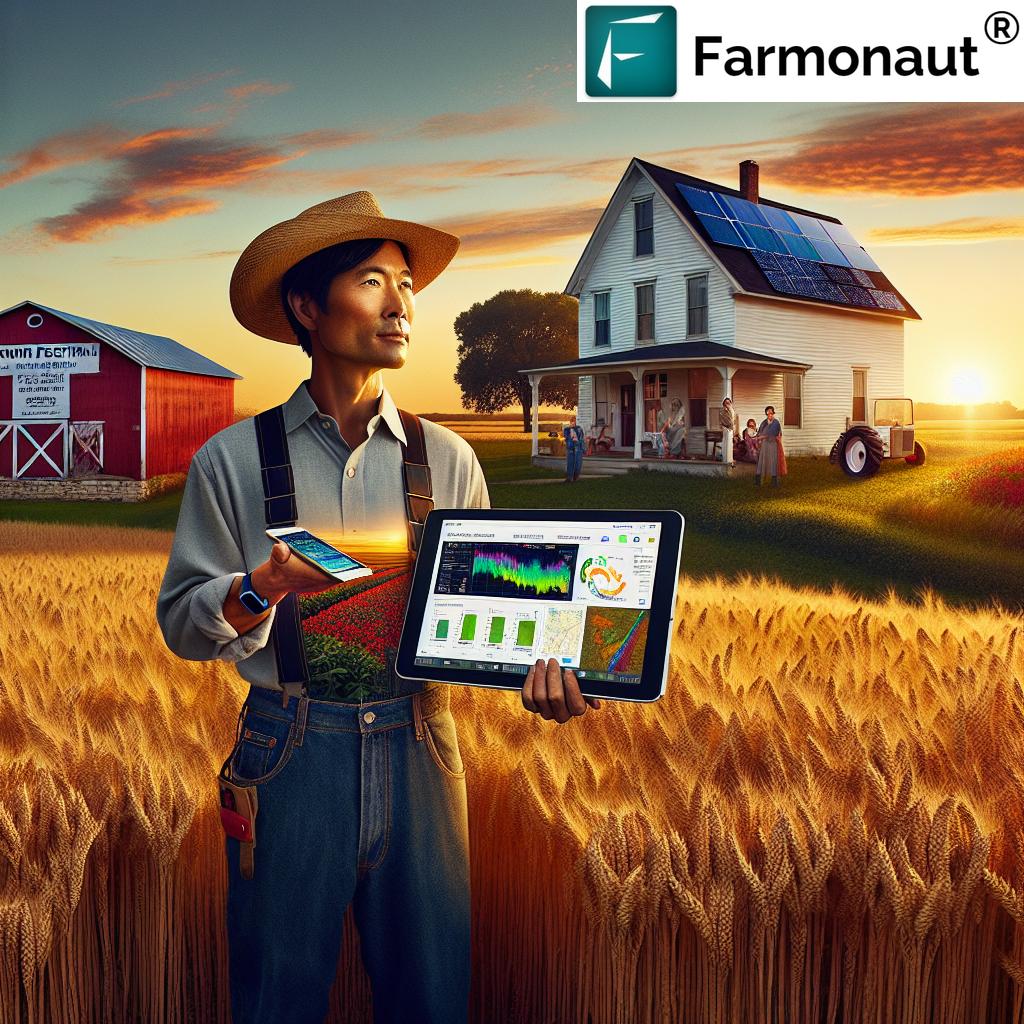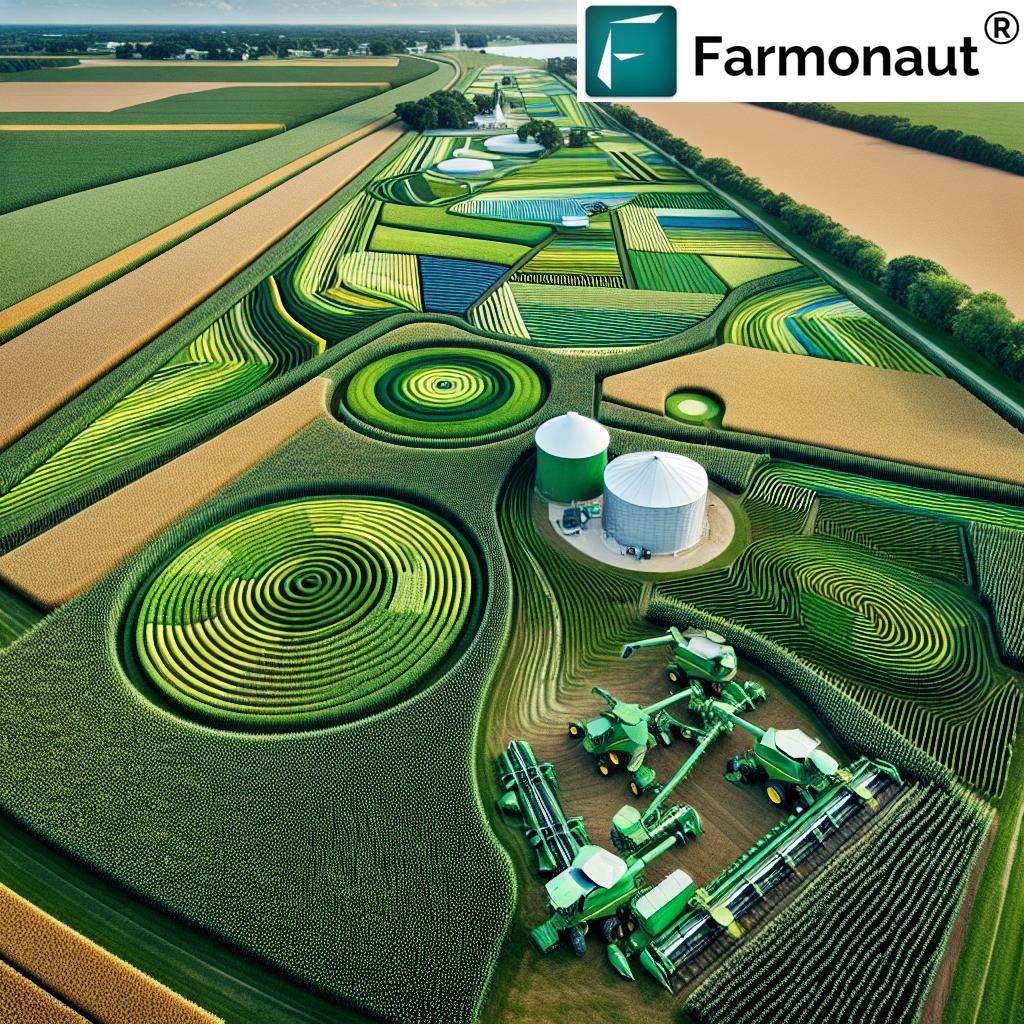Revolutionizing Illinois Farms: How Farmonaut’s Precision Agriculture Technology Boosts Crop Yields and Sustainability
“Farmonaut’s precision agriculture technology has increased crop yields by up to 15% in Illinois farms.”
Welcome to the heartland of America, where the rolling fields of Illinois are undergoing a quiet revolution. We’re not talking about a political upheaval or a cultural shift, but rather a technological transformation that’s changing the face of farming as we know it. In this blog post, we’ll take you on a journey through the charming small towns and tight-knit communities of Illinois, where precision agriculture technology is making waves and changing lives.
From the bustling classrooms of Mount Zion High School to the sun-drenched fields of family farms, we’ll explore how Farmonaut’s innovative solutions are reshaping traditional farm management practices. Get ready to witness the harmonious blend of time-honored traditions and cutting-edge agritech that’s propelling Illinois farms into a new era of productivity and sustainability.
The Heartbeat of Illinois: Where Tradition Meets Innovation
Picture this: It’s a crisp Sunday morning in a small Illinois town. The church bells are ringing, and families are gathering for their weekly services. But there’s something different in the air today. As the high school choir prepares to sing, there’s an unexpected buzz of excitement that has nothing to do with their upcoming performance.
Rich Hansen, a dedicated history and choir teacher at Mount Zion High School, has just returned from a life-changing experience. He’s not only met a former president but has also stumbled upon a revelation that’s about to transform the agricultural landscape of his beloved community.

As the choir warms up, Rich can’t help but share his newfound knowledge with his students. “You know,” he begins, his eyes twinkling with excitement, “I’ve just learned about something called precision agriculture technology. It’s not just about tractors and seeds anymore. We’re talking about satellites, drones, and AI that can help our farmers grow more food while using fewer resources.”
The students lean in, intrigued. This isn’t their usual pre-performance pep talk. Rich continues, “Imagine being able to see exactly which parts of a field need water or fertilizer, or predicting crop yields before harvest. That’s what companies like Farmonaut are bringing to our farms right here in Illinois.”
From Sunday School to Soil Health: A Community’s Journey
As we delve deeper into the story of how precision agriculture is transforming Illinois farms, it’s important to understand the context of these close-knit farming communities. Much like the welcoming tradition of former President Jimmy Carter’s Sunday school classes in Plains, Georgia, Illinois farmers have always been open to sharing knowledge and embracing new ideas that benefit their community.
In towns like Mount Zion and Mahomet, the spirit of innovation is as strong as the sense of tradition. It’s not uncommon to see farmers gathered at the local diner, discussing the latest in crop monitoring systems over a cup of coffee, much like they might discuss the upcoming peanut festival or the high school choir’s latest performance.
This blend of tradition and progress is perfectly exemplified by how Farmonaut’s agricultural remote sensing technology is being integrated into everyday farm life. Let’s explore how this is playing out across the state.
Precision Agriculture: The New Frontier for Illinois Farms
Precision agriculture technology is revolutionizing farming practices across Illinois, and Farmonaut is at the forefront of this transformation. By leveraging advanced satellite imagery and AI-driven insights, Farmonaut is empowering farmers to make data-driven decisions that boost crop yields while promoting sustainability.
Here’s how Farmonaut’s solutions are making a difference:
- Satellite-Based Crop Health Monitoring: Farmers can now track the health of their crops in real-time, identifying issues before they become visible to the naked eye.
- Smart Irrigation Solutions: By analyzing soil moisture levels and weather patterns, Farmonaut helps farmers optimize their water usage, a crucial factor in drought-prone areas.
- Soil Health Monitoring: Understanding soil composition and health is key to sustainable farming. Farmonaut’s technology provides detailed insights into soil conditions, enabling farmers to make informed decisions about fertilizer application and crop rotation.
- Yield Prediction Models: By analyzing historical data and current crop conditions, Farmonaut’s AI can predict harvest yields with impressive accuracy, helping farmers plan their resources and market strategies.
To get started with Farmonaut’s innovative solutions, farmers can easily access the platform through various channels:
The Impact on Local Communities: More Than Just Crop Yields
The adoption of precision agriculture technology is having a ripple effect throughout Illinois communities. Let’s take a closer look at how this technological revolution is impacting various aspects of rural life:
Education and Youth Engagement
Remember Rich Hansen and his high school choir? Well, their story doesn’t end with a simple discussion about farming technology. Inspired by what they learned, the Mount Zion High School decided to incorporate agricultural technology into their curriculum. Now, students are learning about soil health monitoring and yield prediction models alongside their regular subjects.
This integration of agritech into education is preparing the next generation of Illinois farmers to be tech-savvy and environmentally conscious. It’s not uncommon to see students using Farmonaut’s app to analyze satellite images of local farms as part of their science projects.
Community Events with a Twist
The annual Peanut Festival in Plains, Georgia, might have been a highlight for Jimmy Carter’s hometown, but Illinois has its own unique celebrations that are being transformed by precision agriculture.
Take the “Illinois Farm Technology Days,” for example. This event, which used to focus primarily on traditional farming equipment, now features demonstrations of agricultural drone applications and digital farming solutions. Farmers from all over the state gather to see the latest in crop monitoring systems and smart irrigation solutions, turning what was once a simple farm show into a high-tech expo.
Economic Revitalization
The adoption of precision agriculture technology is not just improving farm yields; it’s also creating new job opportunities in rural areas. Local tech support services, data analysts, and drone operators are now in demand, bringing a new wave of economic diversity to small towns.
For instance, in Mahomet, a small town near Champaign, a group of young entrepreneurs has started a business offering drone services to local farmers. They use Farmonaut’s platform to analyze the data collected by their drones, providing valuable insights to farmers who might not have the time or expertise to do so themselves.
The Numbers Don’t Lie: The Quantifiable Impact of Precision Agriculture
“Over 70% of small-town Illinois farmers have adopted remote sensing and crop monitoring systems in the last 5 years.”
As we dive deeper into the impact of precision agriculture on Illinois farms, it’s important to look at the hard data. The numbers paint a compelling picture of how Farmonaut’s technology is transforming the agricultural landscape:
- Water Conservation: Farms using Farmonaut’s smart irrigation solutions have reported water savings of up to 30% compared to traditional irrigation methods.
- Fertilizer Efficiency: Precision application of fertilizers guided by Farmonaut’s soil health monitoring has led to a 20% reduction in fertilizer use while maintaining or improving crop yields.
- Crop Yield Increase: On average, farms using Farmonaut’s precision agriculture technology have seen a 15% increase in crop yields compared to traditional farming methods.
- Time Savings: Farmers report spending 40% less time on field monitoring activities, thanks to Farmonaut’s satellite-based crop health monitoring system.
These statistics aren’t just numbers on a page; they represent real improvements in the lives of Illinois farmers and their communities. Let’s take a closer look at how these changes are playing out on the ground.
A Day in the Life: How Precision Agriculture is Changing Farm Routines
To truly understand the impact of Farmonaut’s precision agriculture technology, let’s walk through a typical day on an Illinois farm that has embraced these innovative solutions.
Morning: Data-Driven Decision Making
The day starts early, as always, but instead of immediately heading out to the fields, our farmer, let’s call her Sarah, begins by checking the Farmonaut app on her smartphone. She reviews the latest satellite imagery of her corn fields, noticing that a section in the northeast corner is showing signs of stress. The app’s AI-powered advisory system suggests that this could be due to a localized pest infestation.
Armed with this information, Sarah can prioritize her day’s tasks, focusing on addressing the potential pest issue before it spreads. This targeted approach saves time and resources, allowing her to address problems proactively rather than reactively.
Midday: Precision Resource Management
As the sun reaches its zenith, Sarah uses Farmonaut’s smart irrigation solutions to optimize water usage across her fields. The system takes into account recent rainfall, soil moisture levels, and weather forecasts to determine the ideal irrigation schedule. This precision ensures that each part of the field receives exactly the amount of water it needs, reducing waste and promoting healthy crop growth.
Meanwhile, Sarah’s neighbor, Tom, is using Farmonaut’s soil health monitoring feature to plan his fertilizer application. By understanding the specific nutrient needs of different areas of his soybean field, Tom can apply fertilizer more efficiently, reducing costs and minimizing environmental impact.
Afternoon: Community and Education
In the afternoon, Sarah hosts a group of students from Mount Zion High School who are learning about precision agriculture as part of their science curriculum. She shows them how she uses Farmonaut’s yield prediction models to estimate her harvest and plan her marketing strategy.
The students are fascinated by how technology is transforming farming. They use their own smartphones to access Farmonaut’s web app, getting hands-on experience with real-world agricultural data analysis.
Evening: Planning for the Future
As the day winds down, Sarah spends some time reviewing Farmonaut’s long-term data trends for her farm. She notices that certain crop varieties have consistently performed better in specific areas of her fields over the past few seasons. This insight will inform her crop rotation and seed selection decisions for the coming year, optimizing her farm’s productivity and sustainability.

The Environmental Impact: Sustainable Farming for a Greener Future
One of the most significant benefits of precision agriculture technology is its positive impact on the environment. By optimizing resource use and minimizing waste, Farmonaut’s solutions are helping Illinois farmers become better stewards of the land.
Reducing Carbon Footprint
Precision agriculture allows for more efficient use of farm machinery, reducing fuel consumption and, consequently, carbon emissions. Farmonaut’s fleet and resource management tools help farmers plan their field operations more effectively, minimizing unnecessary trips and idle time.
Preserving Soil Health
By providing detailed insights into soil composition and health, Farmonaut enables farmers to make informed decisions about crop rotation and soil management practices. This helps maintain soil fertility and structure, reducing the need for chemical interventions and promoting long-term sustainability.
Protecting Water Resources
Smart irrigation solutions and precise fertilizer application not only save water but also reduce the runoff of agricultural chemicals into local water systems. This helps protect Illinois’ rivers and lakes, preserving these vital resources for future generations.
The Future of Farming: What’s Next for Illinois Agriculture?
As we look to the future, it’s clear that precision agriculture technology will continue to play an increasingly important role in Illinois farming. Here are some trends and developments to watch:
Integration of AI and Machine Learning
Farmonaut is continuously improving its AI and machine learning algorithms to provide even more accurate and personalized recommendations to farmers. As these technologies advance, we can expect to see even more precise crop management strategies and yield predictions.
Expansion of Blockchain-Based Traceability
While not directly related to crop production, Farmonaut’s blockchain-based traceability solutions are gaining traction in the agricultural supply chain. This technology could help Illinois farmers differentiate their products in the market by providing consumers with transparent information about their food’s journey from farm to table.
Increased Adoption of Agricultural Drones
While satellite imagery provides valuable insights, the use of drones for more detailed, on-demand field assessments is on the rise. Farmonaut’s platform is well-positioned to integrate drone-captured data, providing farmers with an even more comprehensive view of their crops.
Climate-Smart Agriculture
As climate change continues to impact weather patterns and growing conditions, Farmonaut’s technology will be crucial in helping farmers adapt. Advanced weather forecasting and crop modeling will enable farmers to make informed decisions in the face of increasingly unpredictable conditions.
Comparative Analysis: Traditional Farming vs. Precision Agriculture in Illinois
| Aspect | Traditional Farming | Precision Agriculture with Farmonaut |
|---|---|---|
| Crop Yield Estimation | Based on historical averages and visual inspection | AI-powered yield prediction models with up to 90% accuracy |
| Water Usage | Uniform irrigation across fields | Smart irrigation solutions reduce water use by up to 30% |
| Fertilizer Application | Uniform application based on general recommendations | Targeted application based on soil health monitoring, reducing usage by 20% |
| Pest Management | Reactive approach based on visible signs of infestation | Proactive identification of potential issues through satellite imagery |
| Community Impact | Limited to traditional agricultural jobs | Creates new tech-related job opportunities in rural areas |
| Sustainability Score | Medium | High – Reduced resource use and environmental impact |
| Time Spent on Field Monitoring | High – Regular physical inspections required | Low – 40% reduction in time spent on monitoring activities |
| Data-Driven Decision Making | Limited – Relies heavily on experience and intuition | High – Decisions based on real-time data and AI-driven insights |
Embracing the Future: How Illinois Farmers Can Get Started with Precision Agriculture
For Illinois farmers looking to embrace precision agriculture technology, getting started with Farmonaut is straightforward and accessible. Here’s a step-by-step guide:
- Explore the Platform: Visit Farmonaut’s web app to get a feel for the platform and its capabilities.
- Download the Mobile App: For on-the-go access, download the Farmonaut app from the Google Play Store or the Apple App Store.
- Sign Up for a Trial: Many farmers start with a free trial to test the platform’s features on a portion of their land.
- Attend a Workshop: Look for local agricultural extension offices or community colleges offering workshops on precision agriculture. These often include hands-on training with platforms like Farmonaut.
- Join a Farming Community: Connect with other farmers who are using precision agriculture technology. Many are eager to share their experiences and tips.
- Start Small and Scale Up: Begin by implementing precision agriculture on a small section of your farm, then expand as you become more comfortable with the technology.
For developers and businesses interested in integrating Farmonaut’s technology into their own systems, the company offers an API. You can find more information in the API Developer Docs.
Conclusion: A New Chapter for Illinois Agriculture
As we’ve explored throughout this blog post, precision agriculture technology is not just changing how farms operate; it’s transforming entire communities. From the classrooms of Mount Zion High School to the fields of family farms that have been cultivated for generations, Farmonaut’s innovative solutions are ushering in a new era of sustainable, efficient, and data-driven farming.
The story of Illinois agriculture is one of resilience, innovation, and community. By embracing precision agriculture technology, Illinois farmers are writing a new chapter in this story — one where tradition and innovation work hand in hand to create a more productive and sustainable future.
As we look ahead, it’s clear that the integration of precision agriculture technology will continue to play a crucial role in addressing the challenges facing modern agriculture. From climate change to food security, the tools and insights provided by companies like Farmonaut will be essential in helping farmers adapt and thrive.
For Illinois farmers, the journey into precision agriculture is just beginning. By leveraging the power of satellite imagery, AI-driven insights, and data-driven decision-making, they’re not just improving their own operations — they’re contributing to a more sustainable and prosperous future for their communities and the world at large.
The revolution in Illinois farms is well underway, and with Farmonaut’s precision agriculture technology leading the way, the future of farming looks brighter than ever.
Frequently Asked Questions
- What is precision agriculture?
Precision agriculture is an approach to farm management that uses information technology and specialized equipment to optimize crop yields and reduce waste. It involves collecting and analyzing data about variability in fields to make more precise decisions about planting, fertilizing, and harvesting crops. - How does Farmonaut’s technology work?
Farmonaut uses satellite imagery and artificial intelligence to provide farmers with real-time insights about their crops. The platform analyzes multispectral images to assess crop health, soil moisture, and other key metrics, allowing farmers to make data-driven decisions about farm management. - Is Farmonaut’s technology suitable for small farms?
Yes, Farmonaut’s solutions are designed to be accessible and beneficial for farms of all sizes. The platform offers flexible pricing options and can be scaled to suit the needs of small family farms as well as large agricultural operations. - How can precision agriculture help with sustainability?
Precision agriculture promotes sustainability by optimizing resource use. It helps farmers reduce water waste, minimize fertilizer and pesticide application, and lower fuel consumption, all of which contribute to a smaller environmental footprint. - What kind of training is needed to use Farmonaut’s platform?
Farmonaut’s platform is designed to be user-friendly, with an intuitive interface that most farmers can quickly learn to navigate. The company provides online tutorials and customer support to help users get started. Many agricultural extension offices also offer workshops on using precision agriculture tools like Farmonaut.






